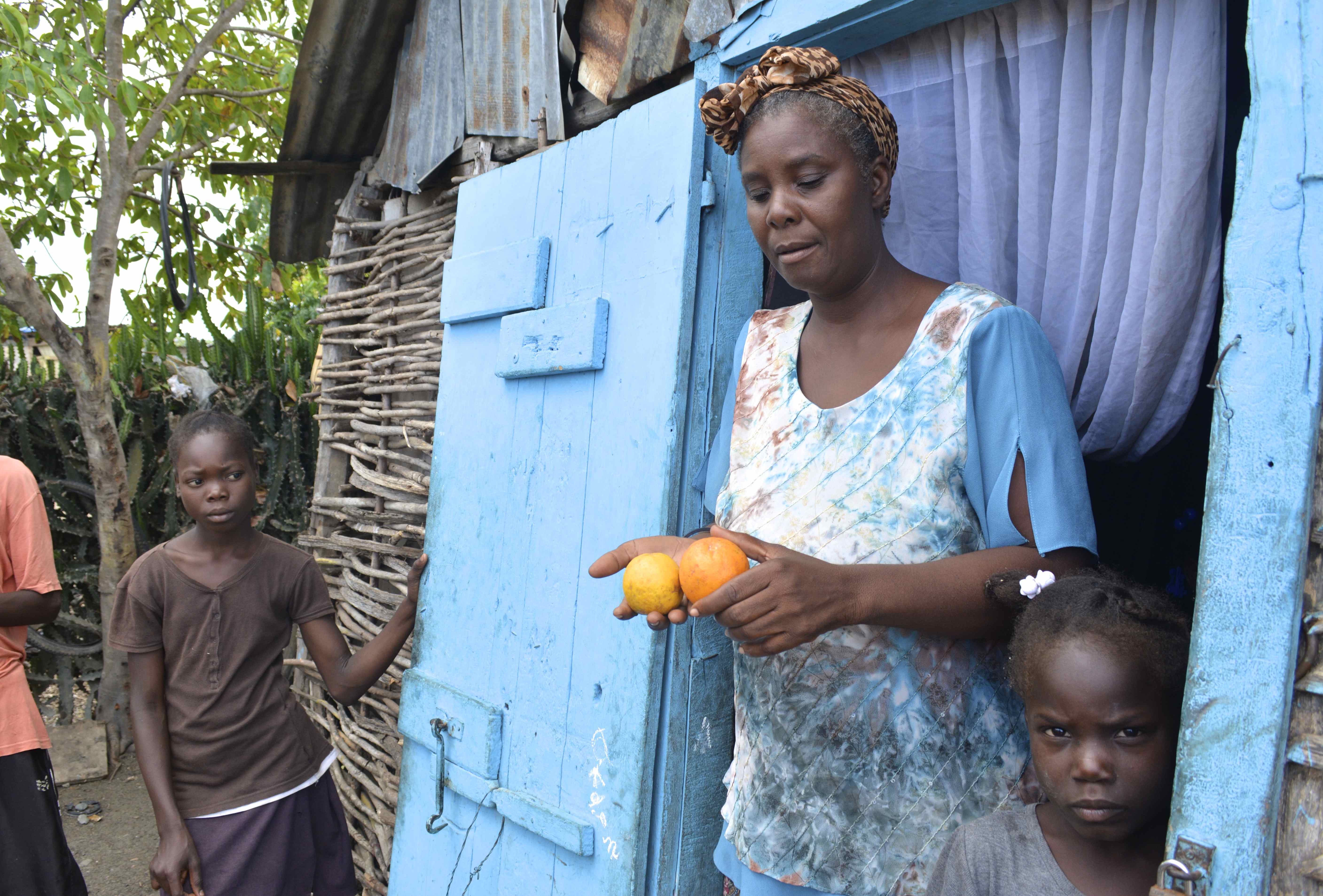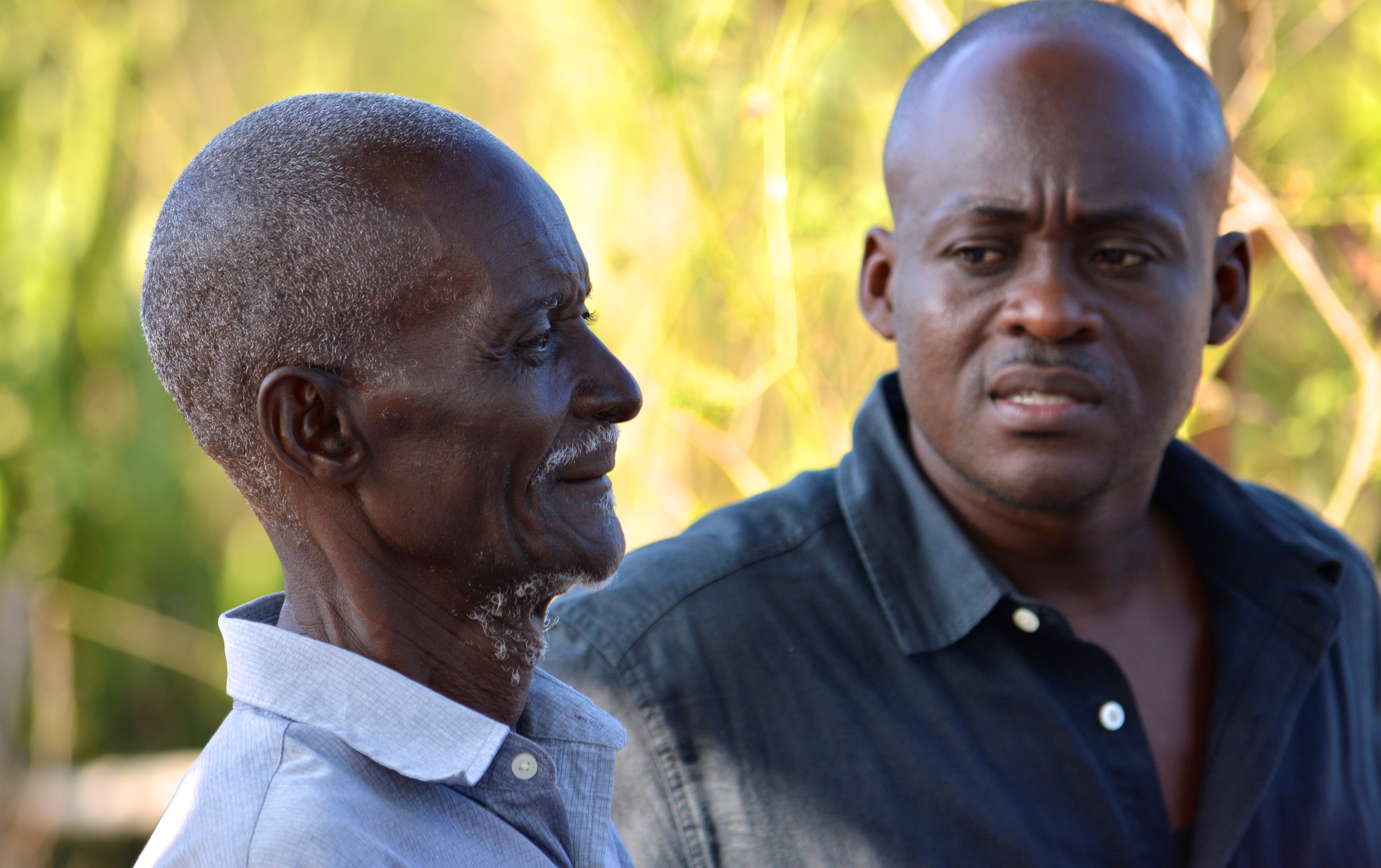By Cindy Corell, Companionship Facilitator, Haiti

Madame St. Etienne holding two oranges outside her home in Trou du Nord. Since losing the property with her family’s garden and fruit trees, she has no way of making money, and yet has to purchase food. Photo courtesy of Cindy Corell.
Madame St. Etienne walked out of the small home she shares with her husband and 10 children near Trou du Nord, Haiti. She showed off two oranges, small, sweet citrus fruits. She’d bought them at the market — three for 5 gourdes. That converts to about 11 cents U.S. It doesn’t seem like much money, unless you have no income. And the worst part? Not long ago, the family had their own fruit trees in the front yard. In September 2013, though, intruders destroyed the trees, along with the family’s garden plots. They tore down the family’s outhouse while plowing the fields adjacent to the home.
Eight hundred families around Trou du Nord were removed from their land. A few, those who had papers to prove they owned the land, remained. Madame St. Etienne is one of them. She and her family continue to live in the small house. But the land around them, has been plowed, leveled and readied for new crops. Specifically for plantains that Agritrans S.A., an agribusiness corporation, under the auspices of the Haitian government, will harvest and give to the government of Venezuela as payment for millions of dollars owed in oil debts.
Members of the 800 affected families have banded together, and they have been joined by other peasant organizations to fight the injustice. What is uncertain is whether or not current Haitian laws will protect their rights.
In the 1990s, peasants in the Artibonite Valley lost land they had farmed to a wealthy owner of adjacent land. The wealthy landowner surveyed his property every few years, and each year his property line was shown to penetrate further into lands held by his peasant neighbors. The neighbors took the landowner to court, but to no avail.
The neighbors organized under the name of Mouvman Revandikas an Peyizan San Tè (MRPST), or the Movement of Peasants Without Land. MRPST was chartered in April 1998 in the region of Dofine, a mountainous community above the Artibonite Valley.
Their campaign for justice led to much violence against them. Three of their members were killed; several others were jailed on flimsy charges. The members came out of hiding and began to operate MRPST as a community-building organization. The group sponsors primary schools, health clinics, micro-loans and continues to work toward justice for peasants.
Andre Ceus, the spokesman for MRPST, said recently that they are willing to help find solutions together. Until there is true agrarian reform in Haiti, the threat of peasants losing land is always at hand.
“That’s the power of the government because the people who farm the land do not have rights,” Ceus said. “This is the colonization (again).”

A landless farmer tells his story while Franky Charles, translates. Photo courtesy of Cindy Corell.
It will take much more study and dialogue to arrive at agrarian reform in Haiti. It is both a chronic and an urgent issue. The people of Dofine still do not have official deeds to their land. And Madame St. Etienne and her neighbors have little or nothing left.
These are the real faces of the call for agrarian reform. It’s a complex issue, but the stories are simple — without agrarian reform, the rights and livelihoods of our brothers and sisters in rural Haiti are threatened. This is why FONDAMA, the Joining Hands network in Haiti, has chosen to focus its campaign efforts on the struggle for agrarian reform.
We must join their struggle in prayer with a willingness to study the issues, the laws and the stories of the people who are affected, so that we might support their efforts in whatever ways we can.
![]() You may freely reuse and distribute this article in its entirety for non-commercial purposes in any medium. Please include author attribution, photography credits, and a link to the original article. This work is licensed under a Creative Commons Attribution-NonCommercial-NoDeratives 4.0 International License.
You may freely reuse and distribute this article in its entirety for non-commercial purposes in any medium. Please include author attribution, photography credits, and a link to the original article. This work is licensed under a Creative Commons Attribution-NonCommercial-NoDeratives 4.0 International License.